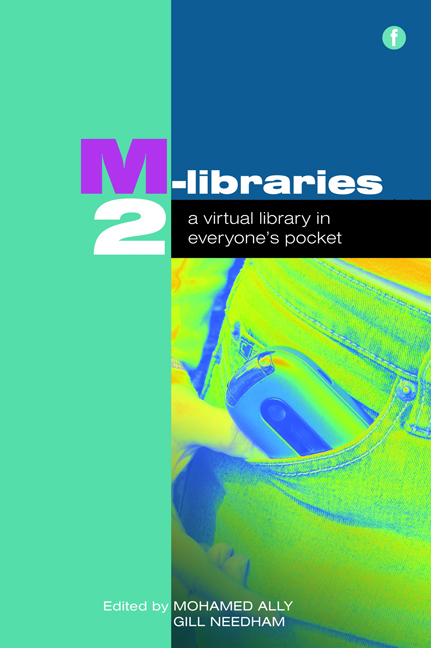Book contents
- Frontmatter
- Contents
- Acknowledgements
- Contributors
- Foreword
- Introduction
- PART 1 M-LIBRARIES: DEVELOPMENTS AROUND THE WORLD
- PART 2 TECHNOLOGY IN M-LIBRARIES
- PART 3 APPLICATION OF M-LIBRARIES
- PART 4 M-LIBRARIES AND LEARNING
- PART 5 BUILDING THE EVIDENCE BASE FOR M-LIBRARIES
- 24 Enhancing library access through the use of mobile technology: case study of information services provided by six mobile companies in Bangladesh
- 25 M-libraries: information use on the move
- 26 UCLA and Yale Science Libraries data on cyberlearning and reference services via mobile devices
- 27 Say what? An SMS transcript analysis at New York University
- Conclusion
- Index
27 - Say what? An SMS transcript analysis at New York University
from PART 5 - BUILDING THE EVIDENCE BASE FOR M-LIBRARIES
Published online by Cambridge University Press: 08 June 2018
- Frontmatter
- Contents
- Acknowledgements
- Contributors
- Foreword
- Introduction
- PART 1 M-LIBRARIES: DEVELOPMENTS AROUND THE WORLD
- PART 2 TECHNOLOGY IN M-LIBRARIES
- PART 3 APPLICATION OF M-LIBRARIES
- PART 4 M-LIBRARIES AND LEARNING
- PART 5 BUILDING THE EVIDENCE BASE FOR M-LIBRARIES
- 24 Enhancing library access through the use of mobile technology: case study of information services provided by six mobile companies in Bangladesh
- 25 M-libraries: information use on the move
- 26 UCLA and Yale Science Libraries data on cyberlearning and reference services via mobile devices
- 27 Say what? An SMS transcript analysis at New York University
- Conclusion
- Index
Summary
Introduction
In this chapter we describe the SMS (Short Message Service) reference service at the New York University Libraries, highlighting the evolution of the service during its first year of operation. We examine in detail a selection of transcripts generated during this period, in order to understand trends both in the nature of users’ interactions with SMS reference and in librarians’ approaches to staffing the service. The transcript analysis provided an opportunity for us to test common hypotheses about user behaviour, including some of the assumptions that characterized our own initial planning. We gave special attention to three assumptions in particular. The first, that our patrons would use SMS to ask questions that were short and simple, primarily directional in nature. We based this assumption largely on other libraries’ published descriptions of their SMS services, in which they reported receiving mostly ‘short answer’ questions (see for example Hill et al., 2007). The second, that our patrons would want to keep the transaction to as few texts as possible, due to messaging costs. The third, that patrons would likely be texting us from remote locations. As we conducted our analysis, we studied transcripts in the context of these assumptions in an effort to measure actual transactions against many of our expectations and anecdotal observations.
We used a modified question categorization scheme – now a standard tool in the analysis of virtual reference activity (De Groote et al. (2005), Diamond and Pease (2001), Kibbee et al. (2002), Marstellar and Mizzy (2003)) – that enabled us to test many of these hypotheses. The analysis helped us to understand how the service changed, grew and improved over time as librarians become more adept; this prompted us to think about some of the broader implications engendered in offering SMS reference, and in so doing to formulate a better contextual understanding of its role within our overall service infrastructure.
Background
New York University (NYU) is an ARL (Association of Research Libraries) Research One institution situated in the heart of Greenwich Village in New York City. It is the largest private university in the world, with a total enrolment of around 50,000 students, about evenly split between undergraduates and graduates. It has expansive programmes in arts and sciences as well as a number of professional schools offering programmes in education, public policy, social work, business and law.
- Type
- Chapter
- Information
- M-Libraries 2A virtual library in everyone's pocket, pp. 255 - 264Publisher: FacetPrint publication year: 2010
- 1
- Cited by



